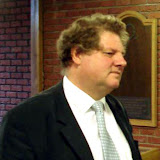Who=s to blame? A bunch of terrorists out of sheer bloody mindedness incite a mob to action over the building of an aqueduct: it stands as a symbol of a regime that has been imposed upon them by a foreign imperialist government which is more interested in milking their economy than giving them proper civil rights. The governor responds by ordering a cavalry charge indiscriminately into a seething mass of freedom marchers: pour encourager les autres. Whose fault is it? The terrorists? The governor? The crowds? The soldiers? Or the system?
The expert replies by reminding them of another disaster recently in the news
In a separate incident eighteen construction workers involved in building this aqueduct are killed when one of the towers collapses. Was this just a tragic accident or was someone to be blamed for that too.?
We live in a fragile world where relationships are all askew: so immensely valuable that it can=t be priced life is nevertheless ended so easily and unpredictably: we all live cheek by jowl with death. Life seems to hang by a hair=s breadth. Allocating blame isn=t the point: we can of course say that it all goes back to the fall but that=s not a helpful analysis since it only pushes the question of blame back a couple of million years.
Rather than waste thinking time allocating blame it is more constructive to think how we should respond to the facts. In a violent suffering world it is all the more important that we make our lives count while we have them.
Think about this for a moment:
A man owns an orchard: on one of his routine visits he notices that one of the trees never seems to have any fruit on it: I suggest we chop it down and replace it with one that is more worthwhile he says. It=s a waste of space , time and resources says the businessman.
No please don=t says the gardener; he has a different relationship with trees: for him they are not simply to be valued in economic terms but for what they are: he who loves to grow them has grown to love them.
It might not be the poor tree=s fault: the blame may lie with me: perhaps I have not been attentive enough to it: I have allowed the soil in this corner of the orchard to become poor: the roots are competing for nutrition with weeds and rubble: give me time. I=ll give this tree a bit of TLC and then we=ll review the situation again next year.
We have been given a life to live both as individuals are more to the point in community: it is important that in whatever time is given to us that we are fruitful and fragrant for the world in which we live often seems like a barren wilderness and we are sorely needed as fruitful oases. That may require - from time to time someone coming along and digging in a bit of manure around our roots: - perhaps I=ll use my father=s euphemism - a bit of good stuff. We may need to be disturbed, at root level before there are signs of fruit at branch level. But thank God he isn=t chopping us down yet: for he loves the trees too much. But nevertheless life is short: sometimes shorter than we think it will be. And the need for fruit urgent.
Not least because we live in a world of pain and dislocation: in the wilderness of despair there have to be signs of hope: there ought to be a difference between a cultivated tree and a wild one: the russet should be sweeter than the crab:
Paul would say that we have been grafted on to the best rootstock the world has ever known: even Jesus himself: the life of the church should stand out as a paradigm of what it is to be human: a human life lived in an eternal dimension: where it matters when it matters for a world that matters: and it matters if we don=t.

No comments:
Post a Comment